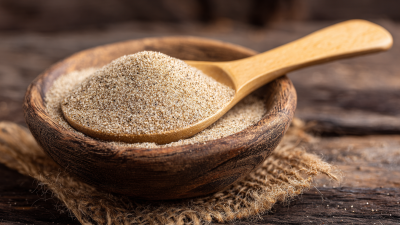Inquiry
Form loading...
Cobalt sulphate, an essential micronutrient, plays a critical role in agricultural productivity and soil health, particularly in the cultivation of crops such as wheat, maize, and rice. According to a report by the International Plant Nutrition Institute (IPNI), deficiencies in cobalt can lead to reduced crop yields and hindered plant growth, highlighting the necessity of incorporating this vital element into modern farming practices. As global populations increase and the demand for food rises, effective utilization of cobalt sulphate becomes imperative for farmers striving to enhance soil fertility and optimize plant nutrition. This blog will explore best practices for implementing cobalt sulphate in your agricultural routines, ensuring that farmers can effectively leverage its benefits while contributing to sustainable agricultural development.

Cobalt sulphate has emerged as an important micronutrient in agriculture, often overlooked in favor of more commonly discussed elements. While it is classified as a non-essential element, recent research emphasizes its positive impacts on crop performance, particularly in enhancing nutrient uptake and improving yields. For instance, studies have shown that cobalt can significantly benefit crops such as peanuts by optimizing irrigation water use and boosting overall productivity under varying irrigation conditions.
Additionally, cobalt plays a key role in the growth and quality of horticultural crops. The supplementation of cobalt has been linked to improved chemical composition and increased yield in crops like sweet fennel. This not only enhances the quality of the produce but also meets the rising demand for sustainable agricultural practices. As farmers look for ways to maximize their harvests, understanding the benefits and applications of cobalt sulphate becomes essential in modern agricultural strategies. Its utilization can contribute to higher productivity and efficiency, ultimately supporting sustainable farming goals.

Cobalt sulphate plays a crucial role in enhancing crop health, particularly for legumes and other cobalt-sensitive plants. Determining the optimal application rates is essential to maximize its benefits without risking toxicity. Generally, application rates can range from 0.5 to 5 kg per hectare, dependent on the specific crop and soil composition. For effective results, soil testing is highly recommended prior to application to ensure that cobalt levels are in the appropriate range.
To achieve optimal results, it is beneficial to apply cobalt sulphate during the early growth stages of crops, as this allows plants to utilize the cobalt effectively. Broadcasting the compound can be an effective method, but incorporating it into the soil can enhance uptake.
Tip: When applying cobalt sulphate, consider using it in conjunction with a balanced fertilizer to support overall plant health.
Tip: Always monitor crop responses to cobalt applications regularly. Adjust rates based on visible plant health and soil tests to ensure you maintain optimal levels for your specific agricultural practices.
Cobalt sulfate is increasingly recognized for its significant role in enhancing soil microbial activity and nutrient uptake, making it a valuable addition to agricultural practices. Soil microbes are essential for maintaining soil health and fertility, as they decompose organic matter, release nutrients, and facilitate nutrient cycling. The introduction of cobalt sulfate can stimulate the growth of beneficial microorganisms, which, in turn, improves the overall microbial biomass and activity in the soil. This increase in microbial activity enhances the breakdown of organic materials, leading to improved soil structure and nutrient availability.
Moreover, cobalt plays a crucial role in nitrogen fixation and the synthesis of important enzymes that plants utilize for growth. In crops, cobalt sulfate not only aids in promoting root development but also enhances the absorption of vital nutrients like nitrogen, phosphorus, and potassium. This improved nutrient uptake results in healthier, more robust plants that are better equipped to withstand stressors such as drought and disease. By incorporating cobalt sulfate into their soil management strategies, farmers can optimize both microbial function and nutrient dynamics, leading to higher crop yields and sustainable agricultural practices.
| Parameter | Control Group | Cobalt Sulphate Treatment | Percentage Change |
|---|---|---|---|
| Microbial Activity (CFU/g soil) | 120 million | 150 million | 25% |
| Soil pH | 6.5 | 6.3 | -3.08% |
| Nitrogen Uptake (kg/ha) | 80 | 95 | 18.75% |
| Phosphorus Uptake (kg/ha) | 30 | 40 | 33.33% |
| Potassium Uptake (kg/ha) | 50 | 65 | 30% |
Cobalt sulphate, a vital micronutrient, plays an essential role in enhancing soil fertility and improving crop yields. According to a recent report by the Food and Agriculture Organization (FAO), cobalt is crucial for the growth of certain leguminous plants, as it aids in nitrogen fixation. By incorporating cobalt sulphate into farming practices, farmers can significantly bolster soil health and, in turn, achieve better economic outcomes. For instance, studies indicate that applying cobalt sulphate can lead to a yield increase of 10-20% for crops like lentils and chickpeas, which can translate into substantial profit margins for growers.
To maximize the economic benefits of cobalt sulphate, it's essential to implement it strategically. One effective tip is to conduct a soil test before application. This will allow farmers to determine the specific nutrient deficiencies in their soil, ensuring the application of cobalt sulphate is tailored to their crops' needs. Additionally, combining cobalt sulphate with other micronutrients can enhance its effectiveness, promoting a more balanced nutrient profile. It's recommended to monitor crop response closely, adjusting application rates as necessary to optimize both growth and economic returns.
Furthermore, farmers should consider the timing of cobalt sulphate application. Applying it during the early growth stages of crops can improve nutrient uptake and boost resilience against environmental stressors. Maintaining a cost-effective approach involves calculating the return on investment (ROI); farmers could see an average ROI of 3:1 when substituting cobalt sulphate for more traditional fertilizers, according to the USDA Agricultural Research Service.
This bar chart illustrates the cost-effectiveness of utilizing cobalt sulphate in various agricultural practices based on yield improvement and cost per hectare.
When utilizing cobalt sulphate in agricultural practices, safety must be a top priority. This chemical compound, crucial for vitamin B12 synthesis in certain crops and livestock, requires careful handling to prevent any adverse health effects. According to a report by the European Food Safety Authority, cobalt exposure can lead to serious health issues, making it essential for farmers to implement strict safety guidelines. Using personal protective equipment (PPE) such as gloves, masks, and goggles is advised while handling or applying cobalt sulphate to minimize the risk of inhalation or skin contact.

In addition to PPE, proper storage practices are critical. Cobalt sulphate should be kept in well-ventilated areas, away from incompatible substances, and securely sealed to prevent accidental exposure. The USDA recommends utilizing precise application techniques to reduce environmental impact and ensure the safety of surrounding wildlife. The recommended application rates vary, but excessive use can lead to soil accumulation and subsequent crop toxicity. Therefore, farmers are encouraged to adhere to guidelines set forth by agricultural extension services, ensuring that cobalt sulphate enhances agricultural productivity while safeguarding health and environmental integrity.






